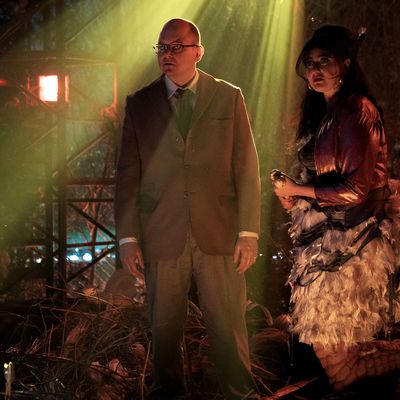
Spoilers ahead for the season-three finale of What We Do in the Shadows.
In its third season, What We Do in the Shadows decided to explore a creature of its own creation: the energy vampire. Originally formulated as an opportunity for an extra joke, Colin Robinson — played to perfection by Mark Proksch — quickly became a central figure in the dramas and machinations of his blood-sucking roommates and their beleaguered familiar Guillermo. He hunts by blending in with humans to feed on whatever irritation he can cause, and over the course of the series, his role expanded in crucial ways: He uses his daywalking abilities to save his roommates from a death sentence; a promotion sees him gain the power to drain people into unconsciousness with a simple “wassup”; at one point he can fly.
Though the show has at various times explored the basic rules of energy vampirism, this season provides a much fuller picture of the relatively short (from a vampiric perspective) lifespan of everyone’s least-favorite Super Bowl party guest. In the penultimate episode, Colin passes away from natural causes, revealing a critical truth: After 100 years, all energy vampires expire, farting through their death throes as they decay into husks of goo. Once the process is complete, the vampire, reincarnated as a baby, bursts forth from the abdomen of the corpse and crawls off to start anew. In honor of this milestone, we’re taking a hard look at the cubicle-loving creature and all he is capable of. Through meticulous research and conversations with showrunner Paul Simms and Proksch himself, we’ve gathered every piece of information on energy vamps available to the general public at this current time.
Colin was originally a single joke.
Co-creator Jemaine Clement initially conceived of Colin for the pilot, wanting to see a new kind of vampire — one that was maybe more relatable. “The reason it resonates with so many people is because it’s a new way of explaining something we all experience, which is those people who leave you feeling drained emotionally, even if they’re not sucking your blood,” Simms said. But there weren’t any big plans for the character initially. “He was going to be a guy who you didn’t see that often, but he lived in the basement.” The role grew out of necessity; while it’s fine for the energy vampire to bore the other characters in the show, it’s not something you want your audience to suffer for. “We were like, we can’t keep doing that over and over again, so we started expanding,” Simms said. “Sometimes it’s less boring people to death and just being annoying and inconvenient and making every situation a little worse.”
They can eat human food (probably).
While we’ve never seen him do it — aside from a moment in the season-two episode “Colin’s Promotion,” where he mentally drinks and expels a bottle of Gatorade — we’ve also never seen him recoil at or violently vomit over the taste of human food the way his blood-chugging roommates do. “We debate this all the time,” Simms said, “but I think they are, in that way, just like normal humans. They might not need human food, but they don’t repel it from their body.” Season three also revealed in no uncertain terms that Colin is able to fart, suggesting the presence of a relatively normal human digestive tract that would accommodate the processing of food.
Being into poop isn’t necessarily a characteristic of the species.
In the season-three premiere, Colin is delighted by nearly every aspect of Guillermo’s imprisonment, particularly his self-assigned task of sifting through the poop bucket in Guillermo’s cell once it becomes full. Proksch suggested this is something inherent to Colin’s actual personality, not necessarily part of a drain. “I think there was something dark there that the writers never really explained or gave any sort of blow to, which is, Colin is clearly obsessed with people’s bowel movements,” he said. It’s also part of a desire to give him new and inventive ways of bothering people. “As a comedy character actor, I’m terrified of being pigeonholed into having a trademark, like ‘Dynamite!” Proksch said. “I want to be a three-dimensional, fleshed-out character for each of the roles I have.” So, can we conclude that one of Colin’s three dimensions is a love of buckets filled with BMs? “I don’t even know if I know the answer,” Simms said. “That’s a hard one to tell, if that was for Colin’s own pleasure or if he knew that every time he mentioned that, everyone would go, ‘Eww’ and he would get a little bit of a drain.” Colin’s use of terms like “Lincoln logs” and “stinky pickles” certainly worked on viewers: “When we turned in the first cut, the network was like ‘Maybe a few too many poop jokes?’ And we were like, ‘ah, I don’t know. They seem pretty good.’”
They look weird in mirrors.
While a classic vamp has no reflection in a mirror — either due to the silver backing of the mirror or their lack of a soul — an energy vampire has a decidedly specific one. “They can see their reflections in mirrors, but their reflection looks a little off, kind of like Dorian Gray — it shows a little more of their true nature,” Simms said. This is apparent in the season-three episode “The Casino,” when Colin is photographing the bathroom counter in their hotel room. “Yeah, I think that is a bit of a VFX coming through, ’cause I’m pretty positive I didn’t look gray on the day,” Proksch said. Colin’s sickly reflection was also a foreshadowing of his demise: “That was definitely an end-stage energy vampire.”
Even the show’s writers don’t know the canonical origin of the energy vampire.
Writing a character that is both intentionally boring and interesting enough to be an enjoyable element of a television comedy is an unenviable challenge — one that ultimately resulted in Colin getting killed off the show for an episode. It also saved the writers from having to give the whole energy-vampire game away. “Everything we came up with for Colin finding out the origin of energy vampires seemed somehow unsatisfying,” Simms said. “It’s almost like revealing the mystery, it’s anticlimactic.” And in the world of Shadows, it’s what prevents Colin from hitting the midlife crisis that sent Nandor wandering the Earth via train. “I think he has the best of both worlds if you consider immortality a great thing to have,” Proksch said. “He doesn’t feel any of that existential crisis until the end of his 100-year cycle, so he has it made in that he’s just reincarnated as himself, every single time, every hundred years.”
About that 100-year cycle …
When asked how the writers decided on a single century for Colin’s lifespan, Simms was blunt: “It seemed like a good round number.” It also provided Colin with a modern enough lineage to make sense of his grandmother’s seemingly 20th-century ghost in the season-two episode “Ghosts.” (To be fair, we don’t know whether that was his biological grandmother, as it’s still unclear whether this was Colin’s first reincarnation or just his most recent one.) This offered Proksch the opportunity to give Colin a decidedly folksy, old-timers’ vibe to contrast with his roommates’ ancient personas. “His most impressionable time was in his teens and in his twenties, so that would have been 1910 to 1930,” Proksch said. [Ed. note: Colin would’ve been a teenager in the 1930s and 1940s, but mentally we are with Proksch in pretending it’s still 2000.] “A lot of his references are of that era and I’m obsessed with old slang and anything that will make me seem even more annoying. Using slang from the ’20s, I mean, how much more annoying can a person in 2021 be?”
They are capable of loving their friends, even as they drain them.
When I asked Proksch whether Colin perhaps intentionally allowed housekeeping to vacuum his roommates’ ancestral soil in order to wreak the kind of havoc he thrives on, Proksch emphatically denied this. “I think that would be a bit too nefarious for Colin because he genuinely loves his roommates,” he said. “He just can’t be around them all that often without killing them.” (Perhaps not literally; see next point.) This also explains Colin’s newfound penchant for angry outbursts in response to his roommates’ insults. “I think he’s starting to feel a little more comfortable showing all of his sides,” Proksch offered. “And when it’s his roommates, I think he’s genuinely hurt when they say certain things.”
It’s still unclear whether energy vampires are literally murderous.
We never see Colin’s drain successfully end anyone’s life, though he and Evie — the emotional vampire he meets in season one — do manage to put one of their co-workers in a coma. I ask Simms if the fact that their victims eventually lose consciousness, and therefore become unable to experience the drain, prevents energy vampires from being able to actually kill anyone. “I think you’re right,” Simms said, much to my delight. “I think the extent of it is putting someone into a coma or having their body shut down by losing so much energy — but then they lose the ability to hear and the drain ends.” He did offer a loophole, though: “Unless there’s some mega-powerful drain where you find one sentence that is so incredibly dull that it just shuts down the whole body.” Terrifying.
And it might be impossible to permanently kill them.
In season three alone, Colin is set on fire and hit by a car, seemingly taking no damage from either. It begs the question: What can kill an energy vampire? “I don’t know if they can be killed,” Simms admitted. “I don’t know if silver has any effect on them or if stakes have any effect on them. He was crushed by a car. He was set on fire and it didn’t seem to phase him at all. He’s been dropped from a great height. No one knows how to kill him.” Proksch, however, has a theory: “I assume you can bore a weaker energy vampire to death,” he said. “I’m sure it’s frowned upon in the energy-vampire circle.”
There’s one way to slow them down.
In season-three episode “The Chamber of Judgement,” Laszlo, who has inexplicably taken a shine to Colin, humors him by pretending to like his Jar Jar Binks voice. But feigned interest is not an effective defense against an energy vampire —it has to be genuine. “We decided that one thing that can really stymie an energy vampire is if the person who’s listening to them is actually interested in what they’re saying,” Simms said. “If they’re trying to bore someone but they wandered onto a topic the person’s actually interested in, then they get no drain at all.”
Baby energy vampires are meant to be unsettling.
Creating a Mark Proksch baby posed an unexpected challenge for the Shadows creative team. “It’s something we’re still figuring out how to do perfectly,” Simms said. They ultimately used a combination of practical effects and VFX to get the right shots for the finale. “We want it to be jarring, like Eraserhead, but still cute because you know, it’s Colin, but also just weird.” In perhaps another unintentional homage to Twilight, the show did produce an upsetting-looking Colin baby doll that’s currently sitting somewhere and can move. “That was an early experiment,” Proksch said. “Very, very lifelike and with my bald head on it. It was incredibly creepy to see.” Though the actor initially had his concerns about the reincarnation— “You do worry, oh shit, is this too much? Is this jumping the shark? Will everyone hate Colin after this? Is it Baby Yoda?” — the “hilarious” scripts convinced him otherwise. But just to be safe, let’s give Baby Colin a little cup of soup to hold next season.





